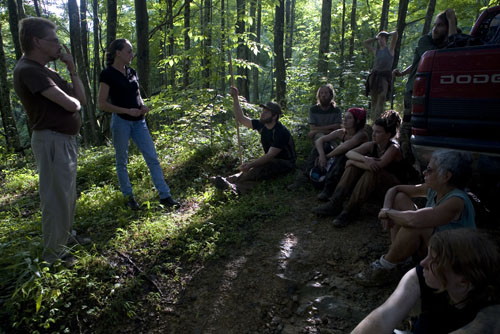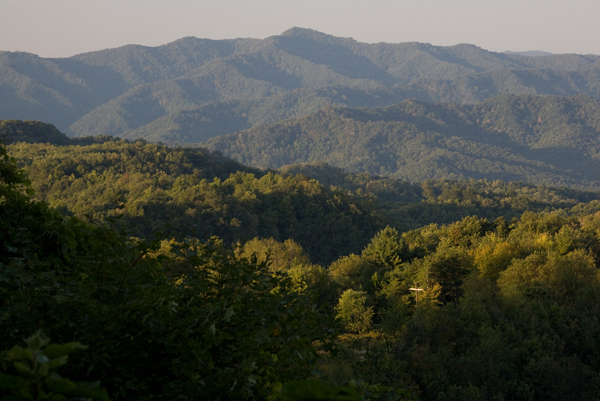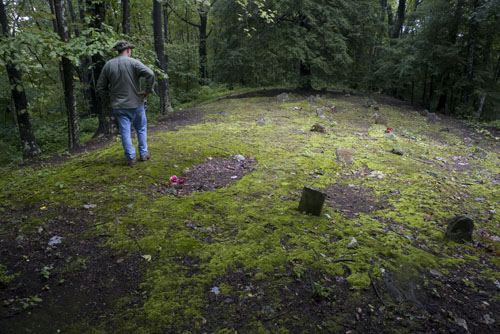
Dialogue on Cook Mountain Begins
by Antrim Caskey
James Creek, WV — A community service project to clear the access road from James Creek up Cook Mountain to three historic Cook family cemeteries spurred an open dialogue between Horizon Resources, LLC coal workers, the Cook family, community activists and Randall White of the Boone County Sheriff’s Department.
The mountain road that has been used for more than two hundred years to access the grave of William Chapman “Chap” Cook, a Union soldier fighting for freedom with a state that seceded from Virginia to take a stand against slavery — an ancestor the Cooks and families throughout Boone County revere for his bravery.
Sheriff White told the group on Cook Mountain yesterday how he has routinely checked in on Chap’s grave over the years, “I stop by to check on it to make sure no on has messed with it…someone might dig him up to get the gold buttons off his uniform!”
Danny Cook, a direct descendant of the Civil War veteran Chap Cook, discovered a series of road blocks on the road connecting Chap’s grave to two other Cook cemeteries about three weeks ago. The community of James Creek immediately responded to what they saw as a violation of West Virginia law that governs access to family cemeteries in close proximity to coal mining operations.
As news of the blocked road spread through the community, reporters and activists began to visit the site and see for themselves how close Horizon Resources coal mining operations were to the Cook cemeteries. Reports on this website elicited a lot of comments, some less savory than others.
Those who have visited Larry Gibson’s family cemeteries on Kayford Mountain, about an hour south of the state capital Charleston, where Stover cemetery is an island surrounded by miles of moonscape and accessible only through the mine site, can imagine the situation on Cook Mountain. Though on Cook Mountain, the moonscape left by mountaintop removal sprawls from only one side of the mountain ridge tip, where the cemeteries stand. The community worries that the blocked access roads — the Lindytown access road is impassable without a 4-wheel drive vehicle, a skilled driver and the physical ability to scramble over a series of five twelve-foot high roadblocks on foot to reach Chap’s grave — signal that the mining company planned to take the whole ridge and swallow up three historic cemeteries.
In fact, less than two weeks ago, Danny Cook said he spoke to Jeff Sammons, superintendent of the Horizon operation, about the cemeteries and Sammons said that he was not aware of any cemeteries.
But yesterday, we spoke with Jeff Sammons, about one hundred yards from the main Cook cemetery which holds about 27 graves. Clearly, Sammons is aware of the cemeteries now. He complained that “not until we got close did they say anything, but as soon as we got close, Danny Cook and them are screaming about this!”
Perhaps that is the point, the cemetery is directly adjacent to a mountaintop removal blasting zone. This distresses family members.
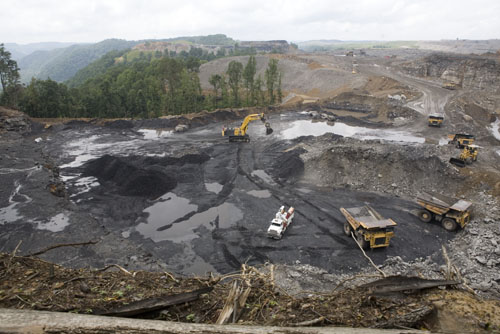
Sammons swore, “We have no intentions of taking out that cemetery or pushing it over the hill…We’re not Massey! We don’t do that!”
Marvin White, who has kin in the cemeteries on Cook Mountain, remains deeply skeptical, swearing he doesn’t believe a word that mine operator says.
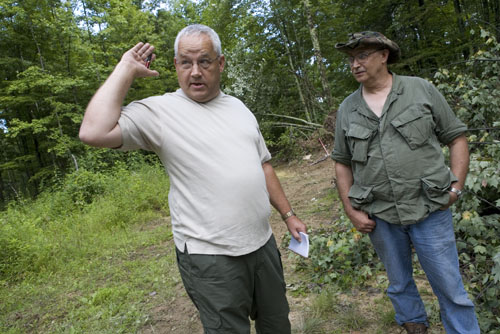
When White’s cousin Randall White, from the Boone County Sheriff department, showed up, Marvin grilled him with questions and secured details of a proposed arrangement to help secure the cemeteries. Randall White vehemently swore that, “Nothing is going to happen to these cemeteries! I live here! I’ve lived here all my life, I’m not going to let anything happen to these cemeteries.”
When he first arrived, the sheriff told a young man helping to drag a pile of sapplings from the road that he was trespassing. White began to mutter about an injunction and $10,000 dollar fines. But when his cousin Marvin White spoke up, the conversation became friendly and open. And it was agreed to that no one was trespassing — Sheriff White understood that the road clearing was a service project dedicated to the Cook family and their historic cemeteries on their homeland.
The volunteers agreed to leave their work as requested by the Sheriff. It was a unique opportunity for dialogue that no one missed.
Randall White promised Marvin White and Danny Cook and the 14 or so people who had come to clear the access road that he’d have deputies stationed at the cemetery road at night and men during the day as well, to make sure the cemeteries were safe.
The second order of business decided upon was to make a measurement and marking of the protective buffer zone around the cemeteries. Randall White, Danny Cook, Marvin White will meet on Saturday, August 1, to mark the boundaries together. Randall White thought he could have his deputies on Cook Mountain in a security rotation as early as Friday evening.
All parties peacefully departed from the conversation. The volunteers who had worked from mid-day to about 5pm clearing three of the 5 muddy roadblocks using shovels, pitch forks, hoes and their hands, walked back towards Chap’s grave, which stands isolated on a spur of the main road, and gathered around the 4-wheel drive vehicles ready to head back down the mountain.
Danny Cook stood before the group in the evening sun that was streaming through the undisturbed forest with tears in his eyes and thanked them for their day of service for Cook Mountain, for the Cook family.
